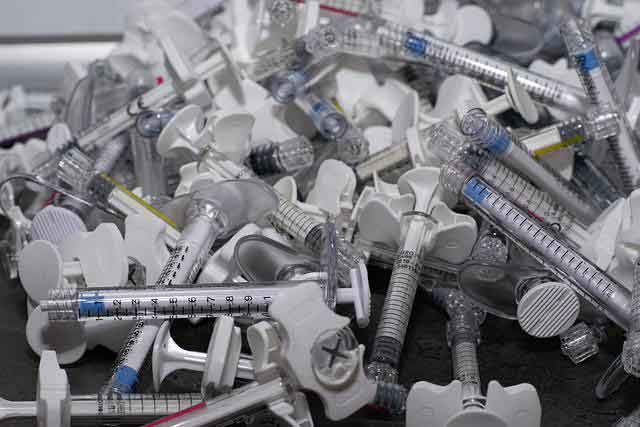
The legislation from Sens. Jeanne Shaheen, D-N.H., and Susan Collins, R-Maine, is the product of months of work to forge a compromise. But the bill still faces daunting political odds in a chamber where narrow margins and election-year tensions make legislating a difficult proposition.
"This legislation is the result of months of good-faith negotiations and input from lawmakers, advocates and experts," Shaheen and Collins said in a joint statement. "It is paramount that Congress act swiftly, which is why we are calling on Senate leadership to bring our legislation to the floor as soon as possible."
The bill would place a $35 monthly cap on the cost of insulin for patients with private insurance as well as those enrolled in Medicare, though it wouldn't afford the same protections to the uninsured. The bill also seeks to make insulin more accessible by cracking down on previous authorization requirements that can force patients to jump through hurdles to get insurers to help pay for medications.
The legislation further aims to reduce the overall price of insulin, not just how much patients pay for it. The senators are targeting discounts that drug companies provide to insurers and middlemen that have been accused of driving up the costs of drugs at the point of sale.
Months before Collins and Shaheen finalized their bill, Senate Majority Leader Chuck Schumer, D-N.Y., pledged to bring the proposal to the floor for a vote.
But even if the bill were to win every Democratic vote, it would still need 10 Republicans' support to advance, a threshold that few bills are able to meet. Senate Minority Leader Mitch McConnell, R-Ky., meanwhile, has said little about the issue in recent months. And the proposal itself is broader in scope than an insulin price cap adopted by the House in March, with only a dozen Republicans supporting that measure.
Shaheen and Collins previously crafted a bill in 2019 aimed at reducing the cost of insulin. But they started work to forge another compromise and build support for the legislation in earnest this spring. With a draft in hand, the bipartisan pair began circulating letters in April in pursuit of 60 total votes, their latest gambit in a quest to lower insulin prices that has spanned decades.
In an interview at the time, Collins sounded optimistic about its prospects, stressing that their attempts to deliver financial relief for diabetes patients would "transcend politics."
"I can tell you there is a lot of interest on both sides of the aisle on this bill," she said.
Shaheen similarly expressed hope that the looming midterm elections - which will determine the composition of Congress next year - would not imperil their attempts to build bipartisan support. "It's not about giving Democrats or Republicans a win. It's about what can we do to help the American people and those with diabetes who are facing really difficult situations," she said.
The legislation has won praise from some major diabetes advocacy groups, such as the Juvenile Diabetes Research Foundation (JDRF), an organization funding research into Type 1 diabetes.
"If we can take steps through this legislation to increase access to affordable insulin, it will not only help people with diabetes, it'll help reduce hospitalizations and reduce kidney disease, things that cost the health-care system and our government a lot of money," said Cynthia Rice, JDRF's chief mission strategy officer.
But House Republicans opposed the $35 price cap, raising the specter of price setting that they argue could harm research efforts. That could foreshadow hurdles in the Senate.
"I'd want to see the bill before I made a decision on it, but generally I'm not supportive of price controls," Sen. Roy Blunt, R-Mo., told The Washington Post this month. "I'm supportive of competition and things that encourage competition."
Adding to the complexity, Democrats have not given up their pursuit of broader prescription-drug pricing revisions as part of a more sprawling economic spending package. That idea, along with an insulin price cap, was a defining element of the roughly $2 trillion plan known as Build Back Better, which party lawmakers ultimately abandoned last year amid opposition from one of their own, Sen. Joe Manchin, D-W.Va.
(COMMENT, BELOW)


 Contact The Editor
Contact The Editor
 Articles By This Author
Articles By This Author